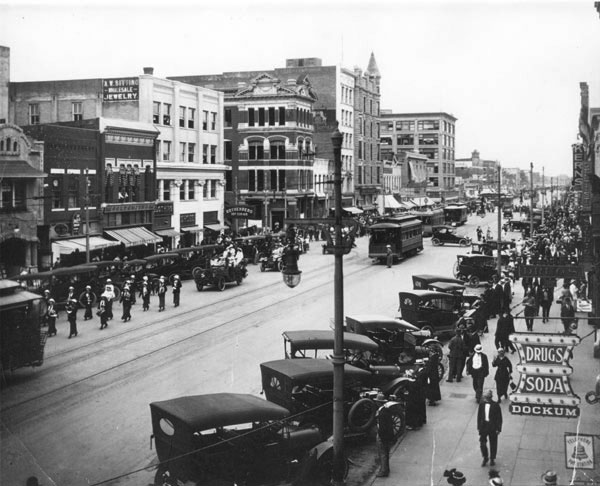Few now are aware, but nearly every American city had electric street cars before World War II. Los Angeles even, now famous for crisscrossing ribbons of freeways, was loaded with street cars. This L.A. Times blog includes pictures of L.A. streetcars circa 1911. Check these out:

...or
Washington, DC is right now trying to bring street cars back to Anacostia and possibly the Purple Line through some of DC's suburbs. But here's a look back at what DC used to be like (complements of Wikipedia's Streetcars in Washington article):
Don't think that the Streetcars were limited to areas outside of "Real America" either. Here's Minneapolis in 1906:

And here's Wichita, Kansas (compliments of the Wichita Photo Archives, which has lots of interesting such photos):

 So what happened to all of these streetcars? What happened to their tracks? The tracks were covered over and the streetcars were destroyed save a few for museums and the like. In some places the tracks weren't even completely covered, like in the stretch of Georgetown on the picture on the right.
So what happened to all of these streetcars? What happened to their tracks? The tracks were covered over and the streetcars were destroyed save a few for museums and the like. In some places the tracks weren't even completely covered, like in the stretch of Georgetown on the picture on the right.And GM wants a bailout...
I say give it to them. Give them a really good bailout. But for the bailout, make them build our streetcars back. I don't say this for "revenge" or social justice, not for the environment or for a chance to legislate better cities. I say it for economics.
If we give GM a bailout on their terms, they will still go to bankruptcy, just a few years later. They can't compete on cars. They made critical mistakes in the last decades: they dropped the ball on quality, they dropped the ball on fuel economy, and they dropped the ball on manufacturing effeciency. GM does not have a credible plan for using our tax dollars to get back in the game and become self-sufficient. When Chrysler got a government bailout in the 80's, they had a plan: the minivan. That worked. Right now, there is no credible plan.
So I say we stick one on them. Use American labor to build streetcars for cities and towns across our nation. Tie our cities together again with high-speed passenger rail with trains built by American labor. Let Hyundai, Honda, Toyota, Nissan, VW, BMW, and Mercedes expand their American presence. Let them employ Americans from Kentucky to Texas, Virginia to California (Detroit is left out on purpose: it shunned foreign car companies-- another critical mistake for Detroit.) Let them go wild building better cars for us. Let our companies earn their bread and butter on American trucks and trains.
If we allow GM to get a handout to keep building cars the way they have, then we are neglecting our fellow citizens at GM who are hard-working but happen to work for a company without a plan. Lets give them one. And while we're at it, lets improve life for tens of millions of Americans by giving them a real alternative to paying more for gas.
Lets not bailout just the fat cats at the failing banks or the complicit auto-CEOs and union leaders who will drive our companies off a cliff. Lets build our rails with American steel, design our trains with American engineering, create our stations with American architecture. Lets employ tens of thousands of Americans to operate and maintain these systems. Lets breathe new life into old towns. Lets bailout America, not just GM.









